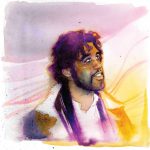Vivek J. Tiwary (1973) is an award-winning producer of theater, film and television. He’s also a big comic book fan and writer of the graphic novel The Fifth Beatle: The Brian Epstein story. ‘The message of the Brian Epstein story is that no dream is too impossible and no person too unlikely to realise that dream.’
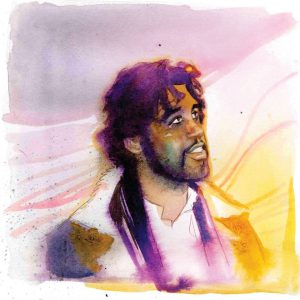
The Fifth Beatle is a captivating, layered and sometimes poetic biography about the manager of the Beatles, who tragically died of an overdose of sleeping pills at the age of 32. (You can read my review on the book here.)
Tiwary wrote it, and the splendid artwork is by Andrew C. Robinson, with a small section illustrated by Kyle Baker. Tiwary is both a fan of, and an investor in, Valiant Entertainment. He has written a story for the Harbinger comic series. And he’s a lover of comics, counting writers like Chris Claremont (X-Men), Kevin Eastman and Peter Laird (Teenage Mutant Ninja Turtles), Neil Gaiman (Sandman) and Hergé (Tintin) as his heroes. So, its not surprising that the scribe was a guest at the Dutch Comic Con in March earlier this year. Vivek did panels and signing sessions at the booth of the American Book Center, and was kind enough to sit down and have a chat with us between sessions.
Why did you want to tell the story of Brian Epstein?
‘In 1991 I found myself in the Wharton School of Business in Philadelphia. I was on a track to join the family business, which operates in food products and finance. That’s what was expected of me as a young Indian kid, and if I wasn’t going to do that, I was expected to be a doctor or an engineer. I was very stressed out about this because those weren’t my dreams. I wanted to write comic books, produce Broadway musicals, do those sorts of things. Wharton in 1991 didn’t have a lot of resources for people with such interests, so I took it upon myself to do my own studies. Being a lifelong Beatles fan and thinking that the Beatles and their management team kind of wrote and rewrote the rules of the pop music business, I thought I’d study the life of Brian Epstein. I knew he discovered the band when they were an unknown Liverpool entity, playing in basement clubs, smoking and drinking on stage. I wanted an answer to these questions: How did Brian come up with the suits and haircuts? How did he get them a record deal when no one wanted to sign the band? How did he convince Ed Sullivan to book them when a British band had never made an impact in the United States? As a young business student, these were the stories I was chasing.
And as I researched them, they were inspiring and fascinating…’
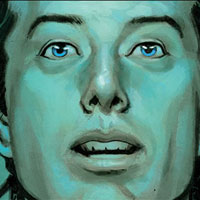
But that’s not the whole story of Brian Epstein, is it?
‘Ironically, what struck a deep, deep chord for me was the aspects of Brian’s life that hadn’t anything to do with the Beatles: his personal life. I was very moved to learn that he was gay in a period in which this was literally a felony. He was Jewish, in a period of time with incredible anti-Semitism and not a lot of Jews working extensively in the music industry. He was from Liverpool, and prior to the Beatles, this was a port town without any cultural significance. So, he was the ultimate outsider. And he believed that this rock ‘n roll band was going to be bigger than Elvis, and that he was going to help the Beatles to elevate pop music into an art from. And that to me was incredibly inspiring. If a gay Jewish kid from Liverpool could change the world through music, why couldn’t a scrawny Indian kid from New York’s Lower East Side like me write a comic book about a rock and roll manager, or put a punk rock album like Green Day’s American Idiot onto a Broadway stage? So that’s why I wanted to tell Brian Epstein’s story. The message of the Brian Epstein story is that no dream is too impossible and no person too unlikely to realise that dream.’
When did you decide to make a comic book about this story. I mean, your forte is producing these big Broadway musicals…
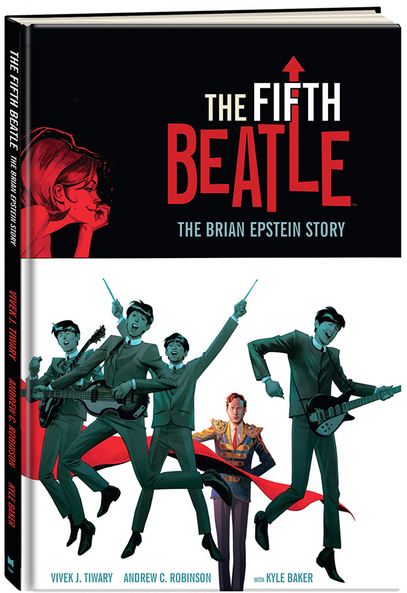 ‘I started to research it for personal inspiration, but ten years later, I decided I wanted to tell this story, but I didn’t see it as a Broadway musical. I am a lifelong comics fan; I grew up reading them. My earliest memory of reading is sitting on my mother’s lap reading Tintin comic books.’
‘I started to research it for personal inspiration, but ten years later, I decided I wanted to tell this story, but I didn’t see it as a Broadway musical. I am a lifelong comics fan; I grew up reading them. My earliest memory of reading is sitting on my mother’s lap reading Tintin comic books.’
Tintin comics? That is quite extraordinary for someone who grew up in the United States…
‘My mother grew up in Guyana, which was a British colony at the time, and she spent her formative years in London. So that’s how we got the Tintin books. Anyway, as I was writing The Fifth Beatle, I decided I wanted to focus on the years Brian spent with the Beatles. I use exposition, dream sequences and flashbacks to tell a little about Brian’s past. This way we learn what makes him tick, but the story really focuses on the time he spends with the Beatles. So it starts off in Liverpool in 1961, which I thought was very depressing, grey and rainy… So I saw it in my head as being very black and white. The story ends in 1967 in London, and this is the dawn of the psychedelic era. It’s the Summer of Love. There was literally an event in the UK called A Technicolor Dream, so I thought as a creator, the arc of the Brian Epstein story mirrors the arc of the movement from black and white to colour. And I believe that the two media that most powerfully use colour in their narrative are comic books and film. And that’s why from the beginning we set out to do both. As you look at it, the first few pages are black, white and blue. The first time we see the band in the book, we add a burst of orange, red and yellow, and we slowly add more and more colour. That’s why I wanted to do it as a comic, you know…’
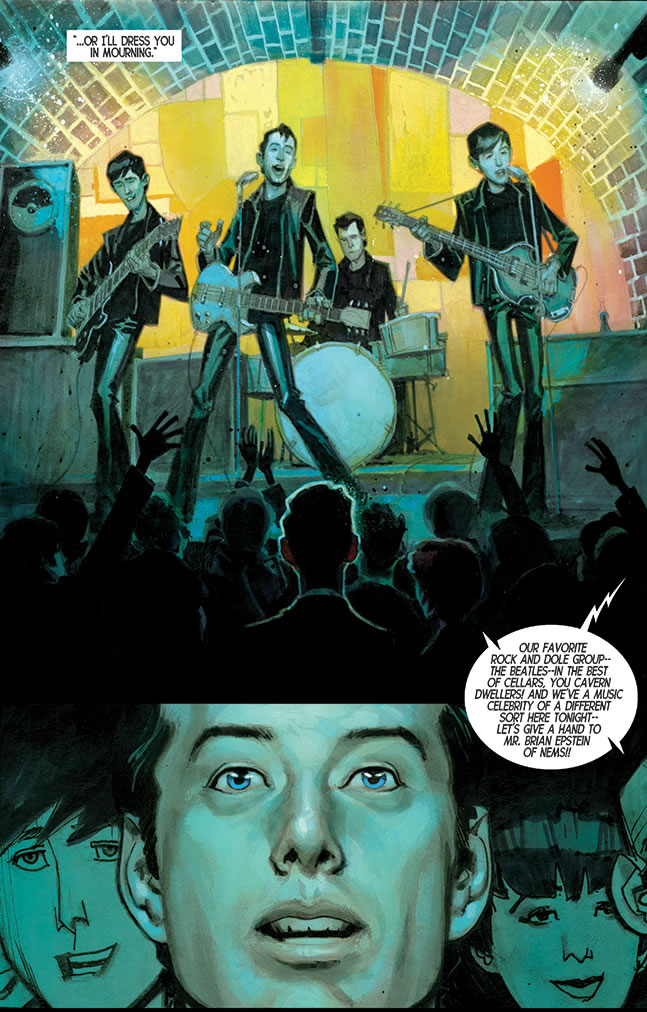
The book starts with Brian getting beaten up violently because he’s gay. It’s quite a statement to begin your story with…
‘Well, most people who’ll pick up this book will be Beatles fans, and they’ll expect the story to be about the band, and when they see this first scene, they’ll realise this is not your typical Beatles story.’
How would you describe Brian Epstein as a person? What did you discover about him?
‘I think he was an incredible passionate person. He was restless. In his earlier years he tried fashion designing, he went to acting school, he was in the army for a brief stint… He was very driven. And he didn’t find his calling until he discovered the Beatles. In the Beatles he found this group that had a great message of love to share with the world. And – not to be too cheesy – but because he was a gay man he had to hide his own love away, to quote a Beatles line… So the Beatles were also a form of vicarious living for Brian. Through them he was able to spread some love into the world. He was also very insecure because of his homosexuality and the persecution he faced because of that. So he also had something to prove, and that was what he was doing by working with the band. He was fulfilling his dreams but he was also proving to the world that a gay man could excel at something that is closely tied to love. I find that incredibly moving.’
You also depict him as someone who thinks that whatever he’s doing, is never enough…
‘I am not a psychologist, but I think that at his core Brian really wanted to be loved, to belong… the most basic of all human things. The trappings of success were a mask to hide his insecurities, I think. And as a result of that he had this great deal of success but he discovered that this really didn’t make him any happier. So as a result of that he thought he needed to be more successful, and then that didn’t make him happier. And so on and so on… And so it was never enough, there was always some way that if the dream could be bigger, the success could be grander. These were worthy goals in and of themselves, but the great irony is that as he achieved these goals, it didn’t actually make him any happier. In the end he stil felt alone.’
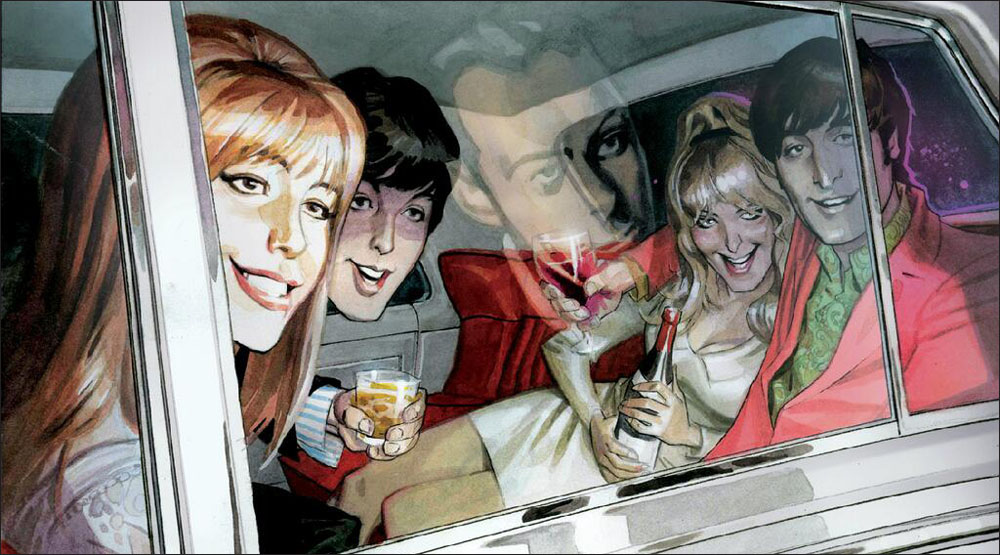
As your first outing as a comic book writer, how did the writing go?
‘It was so much fun. When I was growing up in New York City I went to every single convention that passed through town, comic conventions, horror conventions, Star Trek conventions, and I would wait in line patiently to get autographs by the comic creators that I was a fan of. These people were my heroes. So writing a comic is a dream come true. And I’ve been very humbled by its success. It won all the major comic awards like the Eisner, two Harveys, its even been added to the Rock and Roll Hall of Fame.’
How did working with Andrew C. Robinson go and what does your script look like? Is it more of an Alan Moore kind of script in which every panel is described in detail or do you use something like the movie script form and let Robinson do his own thing with it?
‘My script was a bit of both. There were moments in the script in which I very much knew what I wanted, and I broke it down panel by panel. And I gave Andrew photo references and I said “This is what the clothes should look like; what Liverpool should look like; here’s the camera angles and the lighting I am envisioning”. Andrew is an amazing artist, and very so often he would suggest something else and I would always be open to that. That was one of our back-and-forths. But there were also sequences where I would give Andrew just the dialogue, the tone and what was going through the characters’ minds, and he would translate that into sequential art. He would do that, run with it and come back with brilliant ideas.’
There are elements in this comic that feel rather like a musical number, like from a Broadway show… So I could imagine this story becoming a musical as well.
‘You know, theater is certainly in my blood, and I think that everything that I do will have some sort of theatrical flair. But theater was also in Brian’s blood, him coming up with the suits of the Beatles, the Sgt. Pepper clothes – all that is tied to his love of theatrics and also his love of bullfighting.’
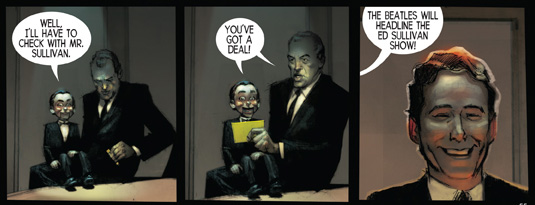 Speaking of show business, let’s talk about the scene with the famous Ed Sullivan talking through a ventriloquist doll. Did you make that up or was he really that crazy?
Speaking of show business, let’s talk about the scene with the famous Ed Sullivan talking through a ventriloquist doll. Did you make that up or was he really that crazy?
‘I made that up. But, it’s been one of those things … When Brian first met with the Ed Sullivan team to negotiate this deal, he met with an underling. A son in-law or a nephew, somebody who was loosely connected to Sullivan. This guy was really just passing the buck, he kept saying to Brian: “That sounds great, but I need to check with Ed. And I can’t really do anything without his approval.” Brian has said that at times he felt like he was talking to a puppet, because this guy was basically useless. He couldn’t do anything or make any decision. So I thought, if Brian thought he was talking to a puppet and I’m trying to tell a story with visuals, why not do it as Ed Sullivan talking through a ventriloquist dummy? So even though I made this up, I think the poetry is accurate.’
What’s the status of the television series based upon your graphic novel?
‘We’ve just closed a deal with Sonar Entertainment. They’ve produced thousands of shows and have been around for a long time. They’ll be financing and producing the show with me. I am staying on board as writer, so I am literally working on the pilot script. I submitted a draft yesterday, hours before I got on the plane to the Netherlands. We are targeting high-end cable and streaming and the plan is to shoot later this year, hopefully. It’s going to be an event-series, that’s what they used to call miniseries. The reason they don’t call them miniseries anymore is because they are not small and mini tends to suggest small. And television always wants to think as big a possible, so with The Fifth Beatle we’re actually contemplating it to be the first season of a larger series tentatively called ‘On the Shoulder of Giants’. The idea is that the series would explore the unsung visionaries from the music industry, people who were the architects of modern pop culture, but who’s stories are largely untold. Season two will be about Colonel Tom Parker, the man who discovered Elvis Presley. The third season will be about Peter Grant, the manager of Led Zeppelin. With The Fifth Beatle we are discussing six one-hour episodes, could be more.’
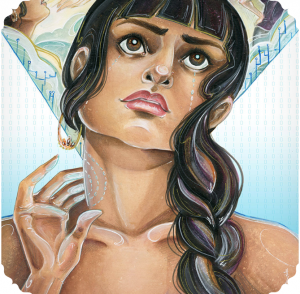 So besides the television series, what are you currently working on?
So besides the television series, what are you currently working on?
‘I am also writing a novel for young adults, called Asha Ascending. It is a novel that’s going to be heavily illustrated by Sara Richard. She’s an amazing Eisner-winning artist. On most Young Adult novels, if they have art work at all, the art is done after the fact. The illustrations are the last step and very often if you are a writer without any cloud, you have not much to say in who the artist is. Sara and I are approaching this much like a comic. I will send her the first draft so she can come up with art ideas. And often times her ideas will change my draft, change the story. We are really going to create it together. The art will really move the narrative forward. (Check out the first chapter at readasha.wordpress.com.)
‘Besides these two projects, I am still working with Alanis Morissette to adapt her album Jagged Little Pill for the stage, Hopefully in the next couple of months we are going to announce the writer for that and the development schedule. We hope to have something off the ground by the end of next year. If people want to keep tabs on me that can do so via tiwaryent.com.’
So, final question. You didn’t become a doctor or lawyer, like your parents wanted you to. Instead, much like Brian Esptein, you found your own path. So, were your parents okay with that in the end?
‘This is something I think about a lot, because my parents unfortunately passed away, but they were very supportive of my dreams. My mom died in 1997 and my father a few years before that… My mother saw me work at Mercury Records, so she began to see I was carving a path for myself in the arts space, but unfortunately she never got to see me producing Broadway shows or write books or any of that sort of stuff. I like to think they’re both looking down on me fondly, from wherever they are. But I don’t know. I do however come from a close-knit Indian family, so my aunts and uncles, people of my parents’ generation really treat me like a second son, they have been very proud and supportive of my work. I like to think that vicariously my parents are supporting me. And to give my family their due credit, they have been great.’
This interview was written for and published on the wonderful blog of the American Book Center.
